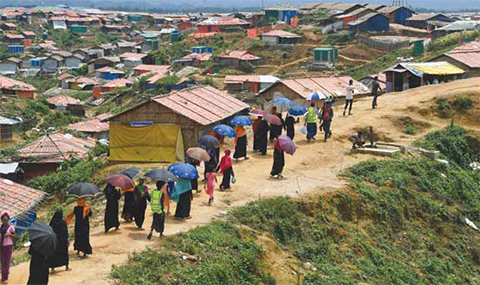 UKHIA: Rohingya refugee volunteers walk along Balukhali refugee camp in Ukhia district near Cox’s Bazar. — AFP
UKHIA: Rohingya refugee volunteers walk along Balukhali refugee camp in Ukhia district near Cox’s Bazar. — AFPCOX’S BAZAR: Rohingya labourer Jamal struggles to carry bricks in the Bangladesh camp that is now home, having lost an arm after being shot and left for dead fleeing an attack in Myanmar one year ago. But like many who fled the violent crackdown by Myanmar forces, the 20-yearold has strived to rebuild his life since joining a million other stateless members of the Muslim minority in the world’s largest refugee camp.
“I try to make a habit of working with it but it’s challenging without my hand,” he told AFP, placing his checkered scarf over the scarred stump of his right arm. “I want to earn some money and support my family. It feels good,” said the expectant father, whose name was changed to protect his identity. Many Rohingya have opened small businesses or market stalls, or found work giving the makeshift hillside shanties in Cox’s Bazar a greater sense of permanence in recent months.
The flimsy shacks and rancid toilets that overflowed as waves of desperate refugees started pouring into Bangladesh last August have been replaced by sturdier structures. Paved roads and drainage canals now cross the camps. For some, this has created opportunities for work and a new sense of purpose after the unspeakable horrors of Rakhine state in Myanmar.
Horror to hope
Juhara, whose name was also changed, passes her days carting water to thirsty bricklayers. She has just one hand - the other was cleaved off in a raid on her village after the August 25 clampdown started last year. Her husband and parents were killed. The 40-year-old said she ran for her life but was hunted down and savagely attacked. “I couldn’t get away. I fell to the ground and they chopped me,” she told AFP, gesturing to her arm and face, missing an eye and badly disfigured from a deep machete wound.
In addition to her scars, she still suffers headaches in the monsoon heat. The work, however menial, has allowed her to support her niece and sister after losing her husband in the brutal Myanmar campaign in which entire villages were burned to the ground.
The United Nations has likened it to ethnic cleansing. The violence drove Furijullah over the border, where he opened a barbershop in May, taking loans from friends to buy supplies and offering haircuts and shaves under a tarpaulin covering. His business grew quickly, and he built a concrete floor and installed a reinforced roof. But despite running a thriving outfit - an enviable position in a sea of destitution - the 32-year-old barber pines for home. “This is just temporary. I have no intention to stay here for any longer than I have to,” he told AFP as he applied foam on a customer for a cut-throat shave. “If we have peace, then we will go back.”
Touch of home
A year after the beginning of the worst refugee crisis in decades, boredom and idleness stalks the gigantic settlements in Bangladesh, where Rohingya are barred from local schools and jobs. Hundreds of thousands of children have not seen the inside of a classroom since crossing into the country, putting them at huge risk of becoming a “lost generation”, warns the UN child agency UNICEF. Arafat has been reading any English book he can get his hands on to try and keep up with his favourite subject. But the 18-yearold feels himself slipping behind, jeopardizing his dreams of becoming a teacher. “I would like learn, but there is no school. I do not know what will happen in the future,” he told AFP, hanging out in an alleyway with his friends.
Military checkpoints surround the claustrophobic camps. More than 58,000 Rohingya have been caught trying to leave since the August influx, local police said. Among them was Shamsu Alam, a 28-year-old farmer and father-of-three, desperate for work to supplement the handouts of rice and lentils his family scrapes by on. He tried to pick up casual work inside the camps but the competition was fierce, forcing him to break the rules. Alam was caught. “I have nothing to do here. We cannot go outside to work. I just want to do something,“ he complained. Others have found purpose any way they can, small rituals to stave off boredom and distract from the misery that abounds in the sprawling camps. — AFP










